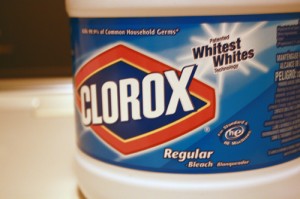Kelly Stewart
Staff Writer
Many people have something in their homes right now that, if disposed of improperly, can cause harm to them as well as the environment.
These items contain hazardous chemicals and are known as

(HHW) and are things that people use in their every day lives, such as paints, batteries and bleach. Some of these, like paint, are things that not everyone uses up completely and, rather than having empty cans of paint lying around the house, some people throw them away, pour them down the storm drains or flush them down the toilet. Using these methods to dispose of the products allows their environmentally-damaging chemicals to sink into the ground or go into the ocean.
“I think what a lot of people don’t realize is that all storm drains lead to the ocean,” Earth 911 website representative Trey Granger said, “so if you were to put motor oil or something down the storm drain, there is no filter before it hits the natural bodies of water.”
This can lead to the buildup of chemicals in the water and harm animal and plant life in the oceans. Pouring HHW down the sink drain is not safe, either.
“When it comes to pouring things down the sink drain, a lot of that stuff goes untreated, so things like pharmaceuticals, medication, bleach, oil, all this stuff […] won’t get treated and it might end up in drinking water,” Granger said.
The adverse effects of drinking this water are not yet completely known, but an article done by the Associated Press found that some scientists, such as Francesco Pomati in Italy, have performed studies which suggest evidence that even small doses of pharmaceuticals that can come from drinking water can greatly slow the growth of human kidney cells, as well as other harmful effects.
“It seems ridiculous that people can’t take care of that waste properly,” Coppell High School junior Isabelle Olivas said, “because it costs a whole lot less than having to purify water.”
Dumping hazardous chemicals in the trash is another way to penetrate the ground water that gathers naturally underground, but Paula Carboni of Coppell’s local Waste Management assured otherwise.
“That’s why we build landfills the way we do,” Carboni said, “to protect the land and water around it from contamination from the landfill itself and the materials that are going into it.”
But Carboni did add that, while HHW materials can be dumped in the landfill, it is not always the best place for them.
“That’s why, when people call, we direct them to the other places that they can take their chemicals to,” Carboni said, “because we don’t want that stuff in the landfill.”
However, if HHW chemicals are properly disposed of, adverse effects on the land and water can be avoided.
“There are collection facilities around the [Dallas/Fort Worth] Metroplex that, depending on where you live, you can take your household hazardous waste for free to them,” Carboni said. “You can also pay to take the waste over there to them.”
The nearest collection facility to Coppell is in Carrollton, Texas. The cost to take them chemicals from Coppell is $95.














